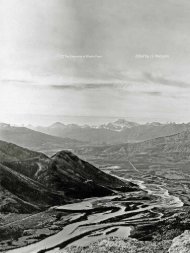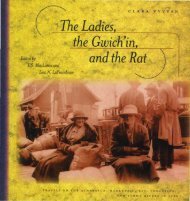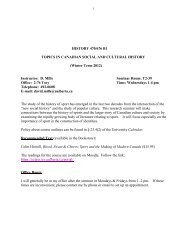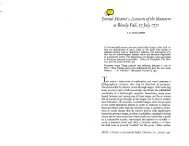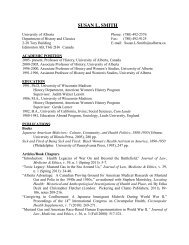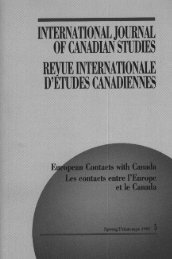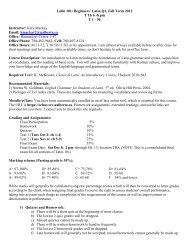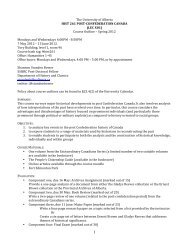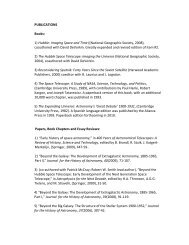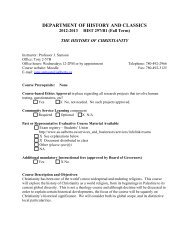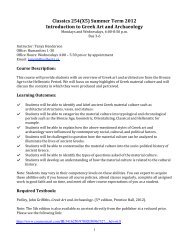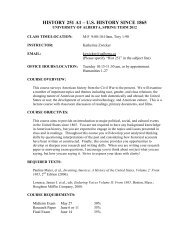Paul Kane's Journal of his Western Travels, 1846-1848 - History and ...
Paul Kane's Journal of his Western Travels, 1846-1848 - History and ...
Paul Kane's Journal of his Western Travels, 1846-1848 - History and ...
Create successful ePaper yourself
Turn your PDF publications into a flip-book with our unique Google optimized e-Paper software.
dently seen the e two books t thought better <strong>of</strong> their<br />
narrative sty Ie than <strong>of</strong> that in Wan,derings <strong>of</strong> an Artist:<br />
"Heays in <strong>his</strong> admirc:lble preface [to the publi hed<br />
book], 'The following pages are the notes <strong>of</strong> my journey,<br />
with little alteration from the original wording as<br />
I jotted them in pencil at the time.' With less than 'a<br />
little alteration' they might have gone with more <strong>of</strong><br />
swing . . . .' '23 The stiff persona <strong>of</strong> the book is that<br />
expected by the British readership - a gentleman's.<br />
But <strong>Kane's</strong> own arises from one raised humbly enough<br />
in muddy York.<br />
After the reader finds <strong>his</strong> or her bearings, there<br />
remains to work out the sense <strong>of</strong> each sentence, in<br />
which punctuation appears infrequently <strong>and</strong> idiosyncratically.<br />
The mostly phonetic spelling requires some<br />
patience. But what gives Kane away as an unaccomplished<br />
writer is the single, run-on sentence for an<br />
entire day' s or week's entry. Thejoumal <strong>of</strong> fur trade<br />
factors, such contemporaries <strong>of</strong> Kane as Samuel Black<br />
<strong>and</strong> Peter Skene Ogden, for instance, exhibit a much<br />
more developed narrative style, as do those by British<br />
explorers such as the artist Robert Hood <strong>and</strong> American<br />
painters such as Frank Blackwell Mayer.~ None <strong>of</strong><br />
them on the other h<strong>and</strong>, attended school in York,<br />
Up~r Canada - or should have attended but didn't,<br />
as was perhaps the case with Kane.<br />
The examination <strong>of</strong> the only two books in <strong>Kane's</strong><br />
own h<strong>and</strong> <strong>of</strong>fers other insights into Kane the traveler<br />
that distinguish him from <strong>his</strong> persona in W<strong>and</strong>erings <strong>of</strong><br />
an Artist. Among these is the glaring fact that the<br />
journal contains no pejorative references to Nativ~<br />
Americans - in itself, t<strong>his</strong> absence justifies the publication<br />
<strong>of</strong> the journal in its original fonn, since Kane t s<br />
W<strong>and</strong>erings has recently been indicted as a racist,<br />
imperialist discourse. 2S Several such references appear<br />
in W<strong>and</strong>erings, as published, partly because <strong>Kane's</strong><br />
persona is quintessentially civilized, .<strong>and</strong>. ~~st, .therefore,<br />
see those who live beyond <strong>his</strong> Civilization as<br />
barbaric. Pejorative references to "savages," however<br />
regrettable one finds them today, were the stock-intrade<br />
<strong>of</strong> t<strong>his</strong> Victorian persona. But these references<br />
caused problems from the outset <strong>of</strong> the book.<br />
On the one h<strong>and</strong>, the <strong>Paul</strong> Kane in the book vows<br />
to act as an objective reconter <strong>of</strong> the Native Americans<br />
<strong>and</strong> their territories; on the other, he tells a tale <strong>of</strong><br />
adventure that yearns to retrieve <strong>his</strong> innocent boyhood<br />
past:<br />
14<br />
TIle subject was one in which I felt a deep interest in my<br />
boyhood. I had been accustomed to see hundreds <strong>of</strong> indians<br />
about my native village, then Little York, ~uddy <strong>and</strong><br />
dirty, just struggling into existence, now the CIty <strong>of</strong> T:oronto,<br />
bursting forth in all its en~rgy <strong>and</strong> commercial<br />
trength. But the face <strong>of</strong> the red man IS now no longer seen.<br />
All traces <strong>of</strong> <strong>his</strong> footsteps are fast being obliterated from<br />
<strong>his</strong> once favourite haunts, <strong>and</strong> those who would see the<br />
aborigines <strong>of</strong> t<strong>his</strong> country in their riginal tate, r seek t<br />
study their native manners <strong>and</strong> custom , must travel ~ar<br />
through the pathle fore t to find them. To me the wild<br />
wood were not altogether unknown, <strong>and</strong> the lndian but<br />
recalled old friends with whom [ had associated in my<br />
childhood . ... 1.6<br />
Apart from the fact that t<strong>his</strong> prelusive passag~ in W<strong>and</strong>erings<br />
<strong>of</strong> an Artist has no near counterpart m .any <strong>of</strong><br />
the six notebooks - either the draft manuscnpts or<br />
the two field books - oddities within it are worth noting.<br />
Kane weD knew, for example, that the forest was<br />
anything but "pathless": the development <strong>of</strong> inl<strong>and</strong><br />
communication had reached an advanced state by 1859,<br />
<strong>and</strong> he had himself started a westward trip in 1849 by<br />
train. One wonders how Kane could have combined<br />
scientific study with romantic sentiment. On top <strong>of</strong><br />
<strong>Kane's</strong> own boyhood fascination, someone has imposed<br />
a couple <strong>of</strong> layers <strong>of</strong> purpose for the travels: to<br />
<strong>of</strong>fer a sort <strong>of</strong> amateur ethnologist's account, <strong>and</strong> to<br />
take a romanticized, nostalgic trip back into the world<br />
<strong>of</strong> the pure Noble Savage. So the personae~s up<br />
being both an involved character <strong>and</strong> a more distant<br />
chronicler <strong>of</strong> the narrative. Both what the genre <strong>of</strong><br />
travel literature dem<strong>and</strong>ed <strong>and</strong> what Kane himself,<br />
however unrealistically, may have wanted jostle with<br />
each other at the outset <strong>of</strong> the book, <strong>and</strong> all the way<br />
through W<strong>and</strong>erings <strong>of</strong> an Artist. David C. Hunt, <strong>of</strong> the<br />
Center for <strong>Western</strong> Studies at the Joslyn Art Museum,<br />
has said that, "for all the attempts to render an accurate<br />
view or produce a believable report, the majority <strong>of</strong> the<br />
artists on the western frontier envisioned <strong>and</strong> perpetuated<br />
what we think <strong>of</strong> today as a romance: one that<br />
may well have been, in a personal sense, real enough to<br />
most <strong>of</strong> them. "27 <strong>Kane's</strong> book certainly helped to perpetuate<br />
the romance; <strong>his</strong> journal does not.<br />
While some examples give the impression that<br />
W<strong>and</strong>erings <strong>of</strong> an Artist adds to, if not improves on, the<br />
contents <strong>and</strong> style <strong>of</strong> the field notes, there are many<br />
instances in which the color <strong>of</strong> <strong>Kane's</strong> own writing<br />
outshines the polish <strong>of</strong> the persona's rhetoric in the<br />
book. After a buffalo hunting trip with the Metis on the<br />
plains west <strong>of</strong> Red River, Kane proceeded down that<br />
river from Fort Garry (today's Winnipeg) to Lake<br />
Winnipeg on July 1, <strong>1846</strong> (W<strong>and</strong>erings gives a date one<br />
week later, July 8th [68]) - a river whose environs<br />
Kane found "beautifull" in <strong>his</strong> journal but "oot very<br />
beautiful" (49) in W<strong>and</strong>erings - Sir George Simpson<br />
<strong>and</strong> Kane encountered a party <strong>of</strong>Sau1teaux. The book's<br />
narration <strong>of</strong> the event reads as follows:<br />
TIle Indians crowded round the boat on our arrival, inquiring<br />
what we wanted. Our interpreter told them that I had<br />
come to take their likenesses. One <strong>of</strong> them, a huge ugly~<br />
looking fellow, entirely naked, stepped up telling me to<br />
MacLaren I Kane





